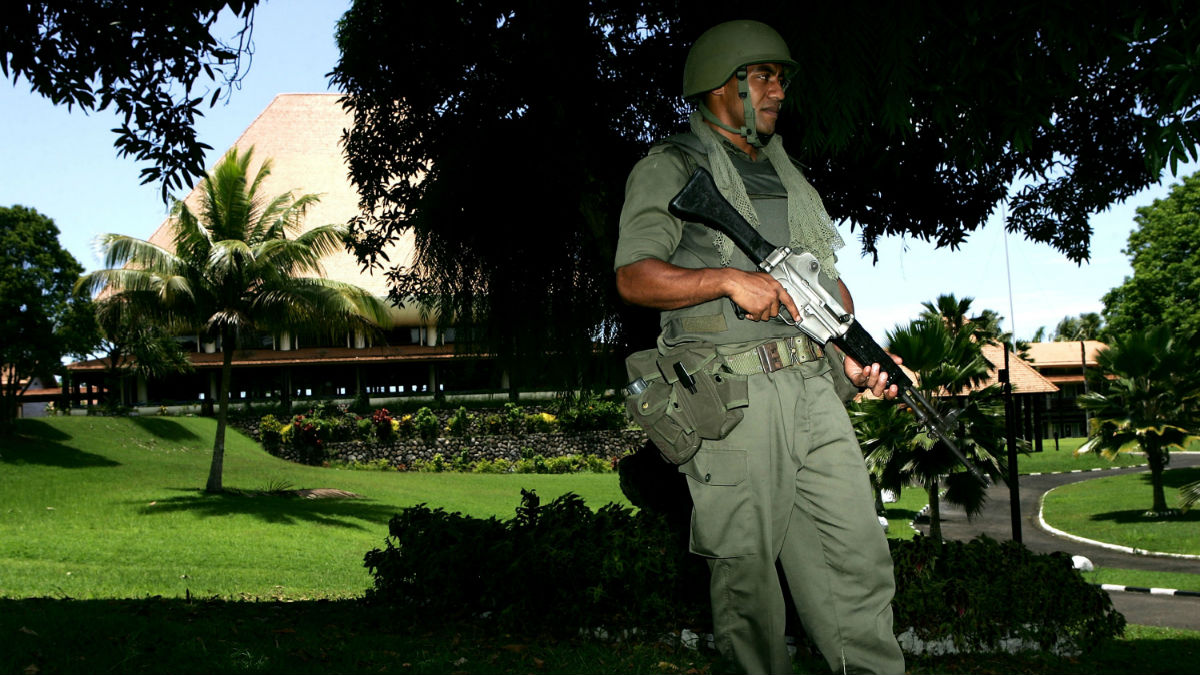Why is Russia secretly donating arms to Fiji?
Alarm bells are ringing at home and abroad as experts question what Moscow stands to gain

A free daily email with the biggest news stories of the day – and the best features from TheWeek.com
You are now subscribed
Your newsletter sign-up was successful
A secret Russian consignment of weapons landed in Fiji last week, arousing suspicions about Moscow's motives in the South Pacific.
The sudden arrival of expensive military equipment has raised alarm bells at home and abroad and prompted experts to question what exactly Russia stands to gain from the tiny archipelago nation.
The Fijian government, which seized control of the country in the 2006 coup, insists the weapons are for its peacekeeping troops. However, opposition politician have hinted at something more sinister.
The Week
Escape your echo chamber. Get the facts behind the news, plus analysis from multiple perspectives.

Sign up for The Week's Free Newsletters
From our morning news briefing to a weekly Good News Newsletter, get the best of The Week delivered directly to your inbox.
From our morning news briefing to a weekly Good News Newsletter, get the best of The Week delivered directly to your inbox.
What happened?
A shipment of 20 containers arrived in the Fiji capital Suva on 14 January. The contents have not yet been made public, but the country's opposition Social Democratic Liberal Party (SODELPA) has speculated they may contain guns, tanks, a helicopter and other military equipment. Russian military experts are also due to travel to the nation soon to train local forces.
Why does Fiji want weapons?
Prime Minister Voreqe Bainimarama's government described the shipment as "aid" and says the guns will be sent to Fijian peacekeeping troops working on United Nation missions around the world.
A free daily email with the biggest news stories of the day – and the best features from TheWeek.com
But the opposition argues the secrecy is suspicious. "The covertness of getting this across without notifying the public, without notifying parliament," SODELPA's Ratu Isoa Tikoca told Radio Australia.
His party has raised fears the weapons could be used against the local population. "Given Fijis history, I think they have reason to be concerned," Paul Buchanan, of the 36th Parallel Assessments, a geopolitical risk assessment consultancy in New Zealand, told ABC News.
Experts say Fiji’s blossoming relationship with Russia represents its continuing pivot away from western countries, with Australia and New Zealand holding little influence or leverage. "They've been replaced by the Chinese, by the Russians increasingly and, to a lesser extent, by the Indians," said Buchanan.
"The Fijians will tell you that it is merely a case of not putting all of their eggs into one basket because they believe they've learned the hard way that dependency on just one or two larger powers has not served their national interests," he added.
So want does Russia want in return?
For Moscow, the transfer may have begun as "simply transactional", Jenny Hayward-Jones, the director of the Melanesia Program at the Lowy Institute, told The Guardian. "But it would be naive to say that Russia does not have intentions. And it will be aware of the perceptions this will create."
Buchanan, meanwhile, believes this is an ongoing battle for political influence in the region. "I think this is an opening pawn move in what’s going to be a much longer chess game," he said.
-
 The environmental cost of GLP-1s
The environmental cost of GLP-1sThe explainer Producing the drugs is a dirty process
-
 Greenland’s capital becomes ground zero for the country’s diplomatic straits
Greenland’s capital becomes ground zero for the country’s diplomatic straitsIN THE SPOTLIGHT A flurry of new consular activity in Nuuk shows how important Greenland has become to Europeans’ anxiety about American imperialism
-
 ‘This is something that happens all too often’
‘This is something that happens all too often’Instant Opinion Opinion, comment and editorials of the day
-
 Epstein files topple law CEO, roil UK government
Epstein files topple law CEO, roil UK governmentSpeed Read Peter Mandelson, Britain’s former ambassador to the US, is caught up in the scandal
-
 Iran and US prepare to meet after skirmishes
Iran and US prepare to meet after skirmishesSpeed Read The incident comes amid heightened tensions in the Middle East
-
 Israel retrieves final hostage’s body from Gaza
Israel retrieves final hostage’s body from GazaSpeed Read The 24-year-old police officer was killed during the initial Hamas attack
-
 China’s Xi targets top general in growing purge
China’s Xi targets top general in growing purgeSpeed Read Zhang Youxia is being investigated over ‘grave violations’ of the law
-
 Panama and Canada are negotiating over a crucial copper mine
Panama and Canada are negotiating over a crucial copper mineIn the Spotlight Panama is set to make a final decision on the mine this summer
-
 Why Greenland’s natural resources are nearly impossible to mine
Why Greenland’s natural resources are nearly impossible to mineThe Explainer The country’s natural landscape makes the task extremely difficult
-
 Iran cuts internet as protests escalate
Iran cuts internet as protests escalateSpeed Reada Government buildings across the country have been set on fire
-
 US nabs ‘shadow’ tanker claimed by Russia
US nabs ‘shadow’ tanker claimed by RussiaSpeed Read The ship was one of two vessels seized by the US military